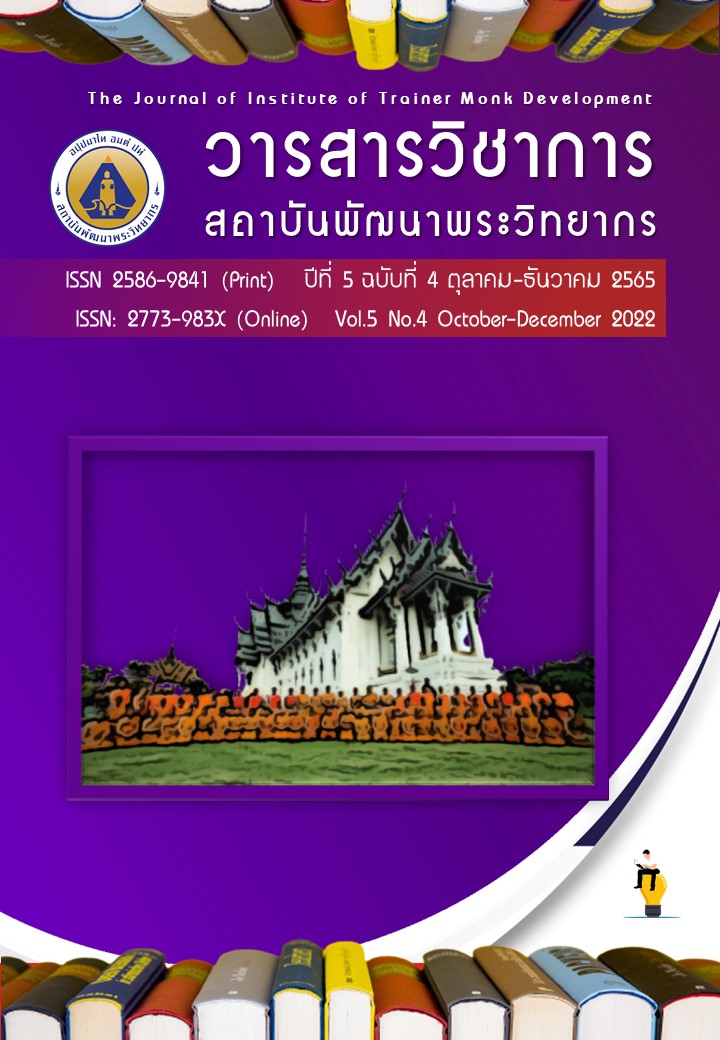An Analysis of Sangha Organizational Management in the Buddha’s Lifetime
Main Article Content
Abstract
The research entitled “An Analysis of Sangha Organizational Management in the Buddha’s Lifetime” consisted of the following objectives: 1) to investigate concepts and theories of organizational management in the present time; 2) to explore the principles of organizational management in the Buddha’s lifetime; and 3) to analyze the principles of Sanga organizational management in the Buddha’s lifetime. The study applied qualitative research as well as focus group and presented by descriptive method. From the study, the following results are found: 1) “POSDCoRB” principle which consists of planning, organizational management, staff management, directing, coordinating, reporting, and budget; “SWOT” analysis of the organizational environment which comprises strengths and weaknesses of internal environment, as well as opportunities and threats of external environment. 2) Organization management according to the management principle "POSDCoRB" The Lord Buddha planned both short-term and long-term religious evangelism. establishing the foundation for disciplinary precepts for the stability of religion assigning suitable persons to perform duties coordination part The report was a collaboration between the disciples. Keep reporting on various matters to improve, correct and follow up on a daily basis. 3) The SWOT of the Sangha Organization in the Buddha's time is (1) strengths include the Buddha, the Dhamma and the noble monks (2) the weaknesses include the monks who are still ordinary people (3) opportunities include the social environment of the Indian Subcontinent during the Buddha's time (4) Obstacles include Brahmanism, Zen religion and the cult of the 6 teachers. There are three approaches to the management of the Thai Sangha Organization in modern times: 1) restructuring the existing Sangha Administration and adding new units; 2) amending the Sangha Act. and 3) Sangha education reform to develop efficiency of Sangha parents.
Article Details

This work is licensed under a Creative Commons Attribution-NonCommercial-NoDerivatives 4.0 International License.
บทความที่ได้รับการตีพิมพ์เป็นลิขสิทธิ์ของวารสารวิชาการสถาบันพัฒนาพระวิทยากร
ข้อความที่ปรากฎอยู่ในบทความที่ได้รับการตีพิมพ์ในวารสาร ถือเป็นความรับผิดชอบของผู้เขียนบทความ และข้อคิดเห็นนั้นไม่ถือว่าเป็นทัศนะและความรับผิดชอบของกองบรรณาธิการวารสารวิชาการสถาบันพัฒนาพระวิทยากร
References
พระพรหมคุณาภรณ์ (ป.อ.ปยุตฺโต). (2559). พุทธธรรม ฉบับขยายความ. พิมพ์ครั้งที่ 46. กรุงเทพมหานคร: บริษัท สหธรรมิก จำกัด.
พระครูอุทัยกิจจารักษ์ (สุรางค์ สุจิณฺโณ). (2556). “รูปแบบการบริหารจัดการการเผยแผ่พระพุทธศาสนา ขององค์กรปกครองคณะสงฆ์ภาค 2”. ดุษฎีนิพนธ์พุทธศาสตรดุษฎีบัณฑิต. บัณฑิตวิทยาลัย: มหาวิทยาลัยมหาจุฬาลงกรณ์ราชวิทยาลัย.
พระครูโสภณปริยัตยานุยุต (เจมศักดิ์ กิตฺติวณฺโณ). (2559) “กลยุทธ์การปกครองคณะสงฆ์กรุงเทพมหานคร เพื่อความมั่นคงแห่งพระพุทธศาสนา”. ดุษฎีนิพนธ์พุทธศาสตรดุษฎีบัณฑิต. บัณฑิตวิทยาลัย: มหาวิทยาลัยมหาจุฬาลงกรณราชวิทยาลัย.
พระครูวิสุทธานันทคุณ (สุรศักดิ์ วิสุทฺธาจาโร). (2557). “การบริหารจัดการวัดเพื่อความมั่นคงแห่งพระพุทธศาสนา”. ดุษฎีนิพนธ์พุทธศาสตรดุษฎีบัณฑิต. บัณฑิตวิทยาลัย: มหาวิทยาลัยมหาจุฬาลงกรณราชวิทยาลัย.
พระมหาธฤติ วิโรจโน. (2559) “รูปแบบการพัฒนาพระสังฆาธิการเพื่อประสิทธิภาพการบริหารกิจการคณะสงฆ์”. ดุษฎีนิพนธ์พุทธศาสตรดุษฎีบัณฑิต. บัณฑิตวิทยาลัย: มหาวิทยาลัยมหาจุฬาลงกรณราชวิทยาลัย.
พระมหาสัญญา ขนฺติธมฺโม (ตรีสวัสดิ์). (2560). “รูปแบบการปกครองสงฆ์ไทยในอนาคต”. ดุษฎีนิพนธ์พุทธศาสตรดุษฎีบัณฑิต. บัณฑิตวิทยาลัย: มหาวิทยาลัยมหาจุฬาลงกรณราชวิทยาลัย,
พระณรงค์ สังขวิจิตร. (2558). “การปกครองคณะสงฆ์ไทยในปัจจุบัน: ปัญหาและแนวทางแก้ไข”. วิทยานิพนธ์ศิลปะศาสตรมหาบัณฑิต สาชาวิชาพุทธศาสนศึกษา. บัณฑิตศึกษา: มหาวิทยาลัยธรรมศาสตร์.
ทรงวิทย์ แก้วศรี. (2551). “การศึกษาวิเคราะห์ยุทธวิธีในการประกาศศาสนาของพระพุทธเจ้า”. ดุษฎีนิพนธ์พุทธศาสตรดุษฎีบัณฑิต. บัณฑิตวิทยาลัย: มหาวิทยาลัยมหาจุฬาลงกรณราชวิทยาลัย, 2551.
มหาวิทยาลัยมหาจุฬาลงกรณราชวิทยาลัย. (2539). พระไตรปิฎกภาษาไทย ฉบับมหาจุฬาลงกรณราชวิทยาลัย. กรุงเทพมหานคร: โรงพิมพ์มหาจุฬาลงกรณราชวิทยาลัย.


